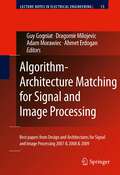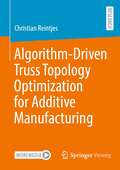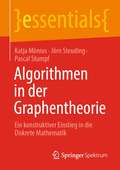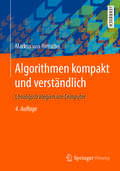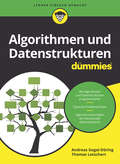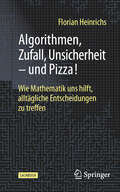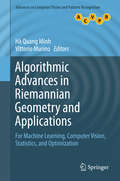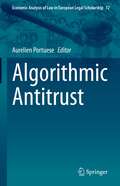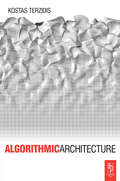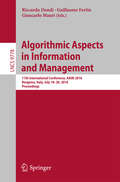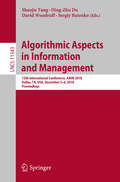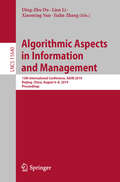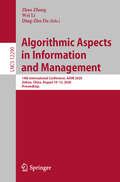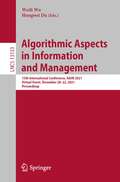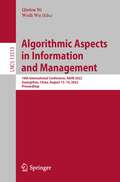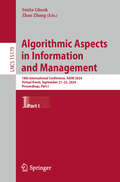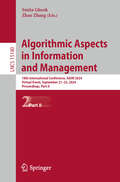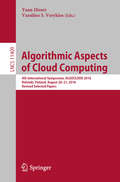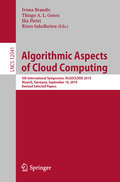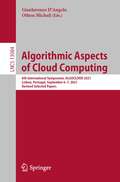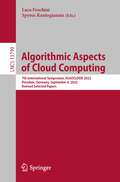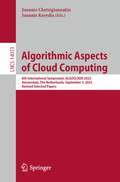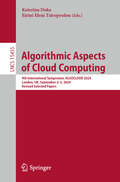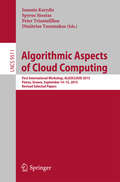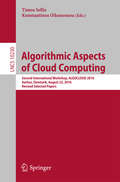- Table View
- List View
Algorithm-Architecture Matching for Signal and Image Processing: Best papers from Design and Architectures for Signal and Image Processing 2007 & 2008 & 2009 (Lecture Notes in Electrical Engineering #73)
by Adam Morawiec Guy Gogniat Dragomir Milojevic Ahmet ErdoganAdvances in signal and image processing together with increasing computing power are bringing mobile technology closer to applications in a variety of domains like automotive, health, telecommunication, multimedia, entertainment and many others. The development of these leading applications, involving a large diversity of algorithms (e.g. signal, image, video, 3D, communication, cryptography) is classically divided into three consecutive steps: a theoretical study of the algorithms, a study of the target architecture, and finally the implementation. Such a linear design flow is reaching its limits due to intense pressure on design cycle and strict performance constraints. The approach, called Algorithm-Architecture Matching, aims to leverage design flows with a simultaneous study of both algorithmic and architectural issues, taking into account multiple design constraints, as well as algorithm and architecture optimizations, that couldn't be achieved otherwise if considered separately. Introducing new design methodologies is mandatory when facing the new emerging applications as for example advanced mobile communication or graphics using sub-micron manufacturing technologies or 3D-Integrated Circuits. This diversity forms a driving force for the future evolutions of embedded system designs methodologies. The main expectations from system designers' point of view are related to methods, tools and architectures supporting application complexity and design cycle reduction. Advanced optimizations are essential to meet design constraints and to enable a wide acceptance of these new technologies. Algorithm-Architecture Matching for Signal and Image Processing presents a collection of selected contributions from both industry and academia, addressing different aspects of Algorithm-Architecture Matching approach ranging from sensors to architectures design. The scope of this book reflects the diversity of potential algorithms, including signal, communication, image, video, 3D-Graphics implemented onto various architectures from FPGA to multiprocessor systems. Several synthesis and resource management techniques leveraging design optimizations are also described and applied to numerous algorithms. Algorithm-Architecture Matching for Signal and Image Processing should be on each designer's and EDA tool developer's shelf, as well as on those with an interest in digital system design optimizations dealing with advanced algorithms.
Algorithm-Driven Truss Topology Optimization for Additive Manufacturing
by Christian ReintjesSince Additive Manufacturing (AM) techniques allow the manufacture of complex-shaped structures the combination of lightweight construction, topology optimization, and AM is of significant interest. Besides the established continuum topology optimization methods, less attention is paid to algorithm-driven optimization based on linear optimization, which can also be used for topology optimization of truss-like structures.To overcome this shortcoming, we combined linear optimization, Computer-Aided Design (CAD), numerical shape optimization, and numerical simulation into an algorithm-driven product design process for additively manufactured truss-like structures. With our Ansys SpaceClaim add-in construcTOR, which is capable of obtaining ready-for-machine-interpretation CAD data of truss-like structures out of raw mathematical optimization data, the high performance of (heuristic-based) optimization algorithms implemented in linear programming software is now available to the CAD community.
Algorithmen in der Graphentheorie: Ein konstruktiver Einstieg in die Diskrete Mathematik (essentials)
by Jörn Steuding Katja Mönius Pascal StumpfDieses essential liefert eine Einführung in die Graphentheorie mit Fokus auf ihre algorithmischen Aspekte; Vorkenntnisse werden dabei nicht benötigt. Ein Graph ist ein Gebilde bestehend aus Ecken und verbindenden Kanten. Wir untersuchen Kreise in Graphen, wie sie etwa beim Problem der Handlungsreisenden oder des chinesischen Postboten auftreten, fragen uns, wie sich mithilfe von Graphen (und insbesondere Bäumen) Routen planen lassen, und machen uns an die Färbung von Graphen, wobei keine benachbarten Ecken mit derselben Farbe versehen werden sollen. Diese klassischen Themen der Graphentheorie werden durch eine Vielzahl von Illustrationen und Algorithmen untermalt, über deren Laufzeit wir uns ebenfalls Gedanken machen. Viele bunte Beispiele erleichtern den Einstieg in dieses aktuelle und vielseitige Gebiet der Mathematik.
Algorithmen kompakt und verständlich: Lösungsstrategien am Computer
by Markus Von RimschaAmeisen organisieren Städtereisen und ein Computer spielt Schach – wie es geht, das zeigt dieses Buch. Auch in der vorliegenden Auflage wird für Programmierer, die bereits erste Erfahrungen gesammelt haben, ein breites Spektrum an Problemlösungsstrategien anhand konkreter und verständlicher Beispiele vorgestellt. <P><P> Sie können künftig selbstständig neue Aufgabenstellungen bewältigen, Optimierungspotential in bestehenden Programmen entdecken und damit bessere Software schreiben.
Algorithmen und Datenstrukturen für Dummies (Für Dummies)
by Andreas Gogol-Döring Thomas LetschertDieses Buch führt Sie sachte in die Denkweisen des Fachs "Algorithmen und Datenstrukturen" ein. Es erklärt Informatik-Anfängern Terminologie, Notation und zentrale Inhalte des Fachgebiets auf anschauliche und sehr unterhaltsame Weise. Ein Fokus sind die Techniken und Tricks, die Sie brauchen, um effiziente Algorithmen und Datenstrukturen zu bauen. Sie werden auch in die Lage versetzt, Pseudocode in der typischen akademischen Darstellung zu verstehen und in unterschiedlichen Programmiersprachen zu realisieren oder umgekehrt grundlegende algorithmische Ideen als Pseudocode zu dokumentieren.
Algorithmen, Zufall, Unsicherheit – und Pizza!: Wie Mathematik uns hilft, alltägliche Entscheidungen zu treffen
by Florian HeinrichsDieses Buch lädt dazu ein, die Welt um uns herum aus einem neuen Blickwinkel zu betrachten und dabei die spannende Verbindung zwischen der Mathematik und unserem täglichen Leben zu entdecken – denn um die Technologien und Entwicklungen unserer modernen Gesellschaft zu verstehen, benötigen wir ein intuitives Verständnis grundlegender mathematischer Ideen. In diesem Buch geht es um diese Grundlagen, vor allem aber um ihre praktische Anwendung im Alltag: Gemeinsam begeben wir uns auf eine unterhaltsame Reise und entdecken dabei, wie Mathematik in vielfältiger Weise allgegenwärtig ist. Anschauliche Beispiele zeigen, wie wir täglich – oft unbewusst – mathematische Ideen nutzen und wie wir mit Hilfe von Mathematik bessere Entscheidungen treffen können. Nach einer Einführung in Algorithmen und Optimierungsprobleme, geht es im weiteren Verlauf um die Modellierung von Zufall und Unsicherheiten. Zum Ende des Buchs werden die Themen zusammengeführt und Algorithmen für Anwendungen besprochen, bei denen der Zufall eine entscheidende Rolle spielt. Sie erfahren unter anderem: Wie Sie systematisch Ordnung in Ihre Plattensammlung bringen können Warum ein vermeintliches Optimum nicht immer optimal ist Wie viele Getränke Sie bei einer Party bereitstellen sollten, damit niemand durstig nach Hause geht Wann Sie besser den nächsten freien Parkplatz nehmen sollten
Algorithmic Advances in Riemannian Geometry and Applications: For Machine Learning, Computer Vision, Statistics, and Optimization (Advances in Computer Vision and Pattern Recognition)
by Hà Quang Minh Vittorio MurinoThis book presents a selection of the most recent algorithmic advances in Riemannian geometry in the context of machine learning, statistics, optimization, computer vision, and related fields. The unifying theme of the different chapters in the book is the exploitation of the geometry of data using the mathematical machinery of Riemannian geometry. As demonstrated by all the chapters in the book, when the data is intrinsically non-Euclidean, the utilization of this geometrical information can lead to better algorithms that can capture more accurately the structures inherent in the data, leading ultimately to better empirical performance. This book is not intended to be an encyclopedic compilation of the applications of Riemannian geometry. Instead, it focuses on several important research directions that are currently actively pursued by researchers in the field. These include statistical modeling and analysis on manifolds,optimization on manifolds, Riemannian manifolds and kernel methods, and dictionary learning and sparse coding on manifolds. Examples of applications include novel algorithms for Monte Carlo sampling and Gaussian Mixture Model fitting, 3D brain image analysis,image classification, action recognition, and motion tracking.
Algorithmic Antitrust (Economic Analysis of Law in European Legal Scholarship #12)
by Aurelien PortueseAlgorithms are ubiquitous in our daily lives. They affect the way we shop, interact, and make exchanges on the marketplace. In this regard, algorithms can also shape competition on the marketplace. Companies employ algorithms as technologically innovative tools in an effort to edge out competitors. Antitrust agencies have increasingly recognized the competitive benefits, but also competitive risks that algorithms entail. Over the last few years, many algorithm-driven companies in the digital economy have been investigated, prosecuted and fined, mostly for allegedly unfair algorithm design. Legislative proposals aim at regulating the way algorithms shape competition. Consequently, a so-called “algorithmic antitrust” theory and practice have also emerged. This book provides a more innovation-driven perspective on the way antitrust agencies should approach algorithmic antitrust. To date, the analysis of algorithmic antitrust has predominantly been shaped by pessimistic approaches to the risks of algorithms on the competitive environment. With the benefit of the lessons learned over the last few years, this book assesses whether these risks have actually materialized and whether antitrust laws need to be adapted accordingly. Effective algorithmic antitrust requires to adequately assess the pro- and anti-competitive effects of algorithms on the basis of concrete evidence and innovation-related concerns. With a particular emphasis on the European perspective, this book brings together experts and scrutinizes on the implications of algorithmic antitrust for regulation and innovation.
Algorithmic Architecture
by Kostas TerzidisWhy does the word design owe its origin to Latin and not Greek roots? Where do the limits of the human mind lie? How does ambiguity enter the deterministic world of computation? Who was Parmenides and why is his philosophy still puzzling today? This unique volume challenges the reader to tackle all these complex questions and more.Algorithmic Architecture is not a typical theory-based architectural book; it is not a computer programming or language tutorial book either. It contains a series of provocative design projects, and yet it is not just a design or graphic art book per se. Following the tradition of architecture as a conglomeration of various design fields - engineering, theory, art, and recently, computation - the challenge of this book is to present a concept that, like architecture, is a unifying theme for many diverse disciplines. An algorithm is not only a step-by-step problem-solving procedure, a series of lines of computer codes or a mechanistic linguistic expression, but is also an ontological construct with deep philosophical, social, design, and artistic repercussions. Consequently, this book presents many, various and often seemingly disparate points of view that lead to the establishment of one common theme; algorithmic architecture.
Algorithmic Aspects in Information and Management: 11th International Conference, AAIM 2016, Bergamo, Italy, July 18-20, 2016, Proceedings (Lecture Notes in Computer Science #9778)
by Riccardo Dondi Guillaume Fertin Giancarlo MauriThis volume constitutes the proceedings of the 11th International Conference on Algorithmic Aspects in Information and Management, AAIM 2016, held in Bergamo, Italy, in July 2016. The 18 revised full papers presented were carefully reviewed and selected from 41 submissions. The papers deal with current trends of research on algorithms, data structures, operation research, combinatorial optimization and their applications.
Algorithmic Aspects in Information and Management: 12th International Conference, AAIM 2018, Dallas, TX, USA, December 3–4, 2018, Proceedings (Lecture Notes in Computer Science #11343)
by Ding-Zhu Du David Woodruff Sergiy Butenko Shaojie TangThis volume constitutes the proceedings of the 12th International Conference on Algorithmic Aspects in Information and Management, AAIM 2018, held in Dallas, Texas, USA, in December 2018. The 25 full papers presented were carefully reviewed and selected. The papers deal with current trends of research on algorithms, data structures, operation research, combinatorial optimization and their applications.
Algorithmic Aspects in Information and Management: 13th International Conference, AAIM 2019, Beijing, China, August 6–8, 2019, Proceedings (Lecture Notes in Computer Science #11640)
by Ding-Zhu Du Lian Li Xiaoming Sun Jialin ZhangThis volume constitutes the proceedings of the 13th International Conference on Algorithmic Aspects in Information and Management, AAIM 2019, held in Bejing, China in August 2019. The 31 full papers presented were carefully reviewed and selected. The papers deal with most aspects of theoretical computer science and their applications. Special considerations are given to algorithmic research that is motivated by real-world applications.
Algorithmic Aspects in Information and Management: 14th International Conference, AAIM 2020, Jinhua, China, August 10–12, 2020, Proceedings (Lecture Notes in Computer Science #12290)
by Ding-Zhu Du Wei Li Zhao ZhangThis volume constitutes the proceedings of the 14th International Conference on Algorithmic Aspects in Information and Management, AAIM 2020, held in Jinhua, China in August 2020. The 39 full papers and 17 short papers presented were carefully reviewed and selected from 76 submissions. The papers deal with emerging important algorithmic problems with a focus on the fundamental background, theoretical technology development, and real-world applications associated with information and management analysis, modeling and data mining. Special considerations are given to algorithmic research that was motivated by real-world applications.
Algorithmic Aspects in Information and Management: 15th International Conference, AAIM 2021, Virtual Event, December 20–22, 2021, Proceedings (Lecture Notes in Computer Science #13153)
by Weili Wu Hongwei DuThis book constitutes the proceedings of the 15th International Conference on Algorithmic Aspects in Information and Management, AAIM 2021, which was held online during December 20-22, 2021. The conference was originally planned to take place in Dallas, Texas, USA, but changed to a virtual event due to the COVID-19 pandemic. The 38 regular papers included in this book were carefully reviewed and selected from 62 submissions. They were organized in the following topical sections: approximation algorithms; scheduling; nonlinear combinatorial optimization; network problems; blockchain, logic, complexity and reliability; and miscellaneous.
Algorithmic Aspects in Information and Management: 16th International Conference, AAIM 2022, Guangzhou, China, August 13–14, 2022, Proceedings (Lecture Notes in Computer Science #13513)
by Weili Wu Qiufen NiThis book constitutes the proceedings of the 16th International Conference on Algorithmic Aspects in Information and Management, AAIM 2022, which was held online during August 13-14, 2022. The conference was originally planned to take place in Guangzhou, China, but changed to a virtual event due to the COVID-19 pandemic.The 41 regular papers included in this book were carefully reviewed and selected from 59 submissions.
Algorithmic Aspects in Information and Management: 18th International Conference, AAIM 2024, Virtual Event, September 21–23, 2024, Proceedings, Part I (Lecture Notes in Computer Science #15179)
by Zhao Zhang Smita GhoshThis two-volume set LNCS 15179-15180 constitutes the refereed proceedings of the 18th International Conference on Algorithmic Aspects in Information and Management, AAIM 2024, which took place virtually during September 21-23, 2024. The 45 full papers presented in these two volumes were carefully reviewed and selected from 76 submissions. The papers are organized in the following topical sections: Part I: Optimization and applications; submodularity, management and others, Part II: Graphs and networks; quantum and others.
Algorithmic Aspects in Information and Management: 18th International Conference, AAIM 2024, Virtual Event, September 21–23, 2024, Proceedings, Part II (Lecture Notes in Computer Science #15180)
by Zhao Zhang Smita GhoshThis two-volume set LNCS 15179-15180 constitutes the refereed proceedings of the 18th International Conference on Algorithmic Aspects in Information and Management, AAIM 2024, which took place virtually during September 21-23, 2024. The 45 full papers presented in these two volumes were carefully reviewed and selected from 76 submissions. The papers are organized in the following topical sections: Part I: Optimization and applications; submodularity, management and others, Part II: Graphs and networks; quantum and others.
Algorithmic Aspects of Cloud Computing: 4th International Symposium, ALGOCLOUD 2018, Helsinki, Finland, August 20–21, 2018, Revised Selected Papers (Lecture Notes in Computer Science #11409)
by Yann Disser Vassilios S. VerykiosThis book constitutes the refereed post-conference proceedings of the 4th International Symposium on Algorithmic Aspects of Cloud Computing, ALGOCLOUD 2018, held in Helsinki, Finland, in August 2018. The 11 revised full papers were carefully reviewed and selected from 29 submissions. The aim of the symposium is to present research activities and results on topics related to algorithmic, design, and development aspects of modern cloud-based systems.
Algorithmic Aspects of Cloud Computing: 5th International Symposium, ALGOCLOUD 2019, Munich, Germany, September 10, 2019, Revised Selected Papers (Lecture Notes in Computer Science #12041)
by Rizos Sakellariou Ivona Brandic Thiago A. L. Genez Ilia PietriThis book constitutes the refereed post-conference proceedings of the 5th International Symposium on Algorithmic Aspects of Cloud Computing, ALGOCLOUD 2019, held in Munich, Germany, in September 2019. The 8 revised full papers were carefully reviewed and selected from 16 submissions. The aim of the symposium is to present research activities and results on topics related to algorithmic, design, and development aspects of modern cloud-based systems.
Algorithmic Aspects of Cloud Computing: 6th International Symposium, ALGOCLOUD 2021, Lisbon, Portugal, September 6–7, 2021, Revised Selected Papers (Lecture Notes in Computer Science #13084)
by Gianlorenzo D’Angelo Othon MichailThis book constitutes the refereed post-conference proceedings of the 6th International Symposium on Algorithmic Aspects of Cloud Computing, ALGOCLOUD 2021, held in Lisbon, Portugal, in September 2021. Due to the COVID-19 pandemic the conference was held online. The 4 revised full papers and 1 short paper were carefully reviewed and selected from 11 submissions. The aim of the symposium is to present research activities and results on topics related to algorithmic, design, and development aspects of modern cloud-based systems.
Algorithmic Aspects of Cloud Computing: 7th International Symposium, ALGOCLOUD 2022, Potsdam, Germany, September 6, 2022, Revised Selected Papers (Lecture Notes in Computer Science #13799)
by Spyros Kontogiannis Luca FoschiniThis book constitutes revised selected papers from the refereed proceedings of the 7th International Symposium on Algorithmic Aspects of Cloud Computing, ALGOCLOUD 2022, which took place in Potsdam, Germany, on September 6, 2022.The 6 full papers included in this book were carefully reviewed and selected from 16 submissions. They were organized in topical sections as follows: Cloud-Based Urban Mobility Services; New Results in Priority-Based Bin Packing; More Sparking Soundex-based Privacy-Preserving Record Linkage and Privacy Preserving Queries of Shortest Path Distances.
Algorithmic Aspects of Cloud Computing: 8th International Symposium, ALGOCLOUD 2023, Amsterdam, The Netherlands, September 5, 2023, Revised Selected Papers (Lecture Notes in Computer Science #14053)
by Ioannis Karydis Ioannis ChatzigiannakisThis book constitutes revised selected papers from the 8th International Symposium on Algorithmic Aspects of Cloud Computing, ALGOCLOUD 2023, held in Amsterdam, The Netherlands, on September 5, 2023. The 13 full papers included in this book were carefully reviewed and selected from 24 submissions. They focus on algorithmic aspects of computing and data management in modern cloud-based systems interpreted broadly so as to include edge- and fog-based systems, cloudlets, cloud micro-services, virtualization environments, decentralized systems, as well as dynamic networks.
Algorithmic Aspects of Cloud Computing: 9th International Symposium, ALGOCLOUD 2024, London, UK, September 2–3, 2024, Revised Selected Papers (Lecture Notes in Computer Science #15455)
by Katerina Doka Eirini Eleni TsiropoulouThis book constitutes the refereed proceedings of the 9th International Symposium on Algorithmic Aspects of Cloud Computing, ALGOCLOUD 2024, held in London, UK, during September 2024. The 9 full papers and 1 short paper presented here were carefully reviewed and selected from 18 submissions.They focus on various topics in the emerging area of algorithmic aspects of Computing and data management in modern Cloud-based systems.
Algorithmic Aspects of Cloud Computing: First International Workshop, ALGOCLOUD 2015, Patras, Greece, September 14-15, 2015. Revised Selected Papers (Lecture Notes in Computer Science #9511)
by Peter Triantafillou Ioannis Karydis Spyros Sioutas Dimitrios TsoumakosThis book constitutes the thoroughly refereedpost-conference proceedings of the First International Workshop on AlgorithmicAspects of Cloud Computing, ALGOCLOUD 2015, held in Patras, Greece, inSeptember 2015 in conjunction with ALGO 2015. The 13 revised full papers presented together with 2tutorial papers were carefully reviewed and selected from 37 initialsubmissions. They cover a wide range of topics in two main tracks: algorithmicaspects of large-scale data stores, and software tools and distributedarchitectures for cloud-based data management.
Algorithmic Aspects of Cloud Computing: Second International Workshop, ALGOCLOUD 2016, Aarhus, Denmark, August 22, 2016, Revised Selected Papers (Lecture Notes in Computer Science #10230)
by Timos Sellis Konstantinos OikonomouThis book constitutes the thoroughly refereed post-conference proceedings of the Second International Workshop on Algorithmic Aspects of Cloud Computing, ALGOCLOUD 2016, held in Aarhus, Denmark, in August 2016. The 11 revised full papers presented together with one tutorial paper were carefully reviewed and selected from 30 initial submissions. They deal with the following topics: algorithmic aspects of elasticity and scalability for distributed, large-scale data stores (e. g. NoSQL and columnar databases); search and retrieval algorithms for cloud infrastructures; monitoring and analysis of elasticity for virtualized environments; NoSQL, schemaless data modeling, integration; caching and load-balancing; storage structures and indexing for cloud databases; new algorithmic aspects of parallel and distributed computing for cloud applications; scalable machine learning, analytics and data science; high availability, reliability, failover; transactional models and algorithms for cloud databases; query languages and processing programming models; consistency, replication and partitioning CAP, data structures and algorithms for eventually consistent stores.
